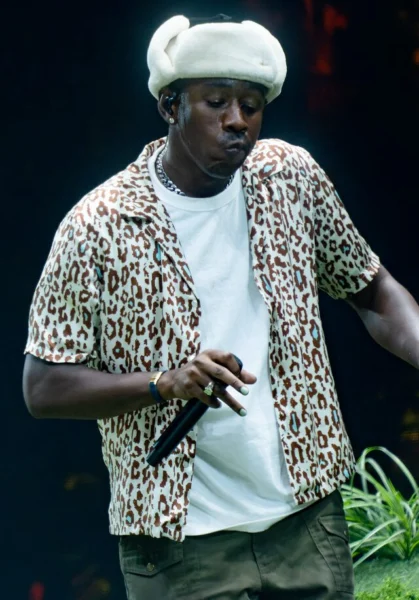
Released on 21 July 2025, Tyler, the Creator’s ninth studio album marks his latest offering, acting as a second course to his previous album, Chromakopia. Tyler is known for merging alternative hip-hop with West Coast and jazz influences, and for being a lyrical genius who often expresses his listeners’ most desperate, vulnerable thoughts. Don’t Tap the Glass has received generally positive reviews from critics and debuted at number one on the Billboard 200.
Despite some claiming this is a straightforward album with no need for overthinking, I beg to differ.
Tyler often uses “alter egos” for each of his albums, with characters like Wolf Haley, Igor, and Tyler Baudelaire; Don’t Tap the Glass is no exception. The album opens with the debut of “Big Poe”, a swaggering, hyper-macho, dance-floor dictator leading listeners to move freely. Big Poe sets out three core rules: First, no sitting still (body movement only); second, only speak in glory (no negativity); and third, don’t tap the glass (don’t be self-conscious, don’t film others, and resist becoming an exhibit). Tyler uses the character of Big Poe to deliver satirical, sharp bravado, with lines like “I don’t trust white people with dreadlocks,” which reveals the hidden real-life conflict of cultural appropriation, demonstrating Poe’s guarded nature. Despite some claiming this is a straightforward album with no need for overthinking, I beg to differ. Rather than a traditional narrative with plot points, Tyler offers a unique conceptual journey throughout. Big Poe sets the dance-floor as a sanctuary where you must follow his big three rules. The rules Tyler posted to Instagram for his intimate, no-phones listening party serve as both literal staging and a metaphorical critique of modern fame, surveillance culture, and the anxiety of being seen.
The journey: A night with Big Poe
Entrance and ego establishment (Tracks 1-3)
The first three tracks introduce the listener to the character and rules. We enter his house, learn the code, and meet the confident, controlling persona. In the songs “Sugar on My Tongue” and “Sucka Free,” we embark on a ride of indulgence and pleasure as Big Poe flexes and moves. He’s in control; we’re living in his world. He’s confident, revelling in bravado and funk.
Disruption and reflection (Tracks 4-6)
There is an eerie interlude, and Poe’s confidence falters. There’s suspicion and threat. “Stop Playing with Me” is a loud retaliation where Poe’s temper flares up. He’s fighting back against critics, fans, and maybe himself – his doubt. He closes with a reflection in the song “Ring Ring Ring,” where the listener gets their first sign of emotional vulnerability. Despite the flexing and flirting, Poe is trying to connect with someone. But they’re not answering, leading to a crack in the mirror.
Climax and Fallout (Tracks 7-8)
In tracks seven and eight, self-awareness kicks in, as “Don’t Tap That Glass / Tweakin’” serves as the emotional and sonic climax. Big Poe’s warning comes true, someone taps the glass, and chaos ensues. The second half, “Tweakin”, spirals out of control, with ‘Don’t You Worry, Baby’ being the fallout. Madison McFerrin’s soft vocals offer comfort, perhaps to Poe or from Poe to someone else.
Resolution and reckoning (Tracks 9-10)
The album ends with tracks nine and ten. “I’ll Take Care of You” is a distant, dreamy song, sung rather than rapped. This is not Poe, but rather Tyler re-emerging, letting someone else (Yebba) guide the song. The album ends abruptly with “Tell Me What It Is,” seemingly with an existential hangover. Tyler says, “Mama, I’m a millionaire/But I’m feelin’ like a bum.” The bravado is gone. The party ends in uncertainty, exhaustion, and longing. By the end of the album, Big Poe loses control of the space he built, the glass is tapped, the illusion breaks, and Tyler is left with a mirror held up to him, confronting real feelings of loneliness, exhaustion, and disconnection. The album ends with a twist on the cardinal rule: “The glass was not tapped.” The illusion wasn’t shattered by someone else; rather, by taking off the mask, he realises that he can’t even blame us (the audience/listener) for the collapse, as it happened because it was already inside him.
Throughout the album, listeners embark on a one-night journey through the mind of someone who doesn’t want to be seen but ends up exposed anyway. Just like IGOR or Sir Baudelaire, the album ends with Tyler flipping sentiment into sarcasm: “Maybe next time you could stay longer… (Take your ass home).” On the surface, it sounds like a wistful goodbye, echoing tenderness, continuing the emotional thread from earlier, and highlighting the tension between connection and control. He then flips, immediately becoming cold and dismissive, in Tyler’s signature mocking tone. Reflecting a defence mechanism, Don’t Tap the Glass means don’t look too closely, but in the end, he lets us see just enough.


